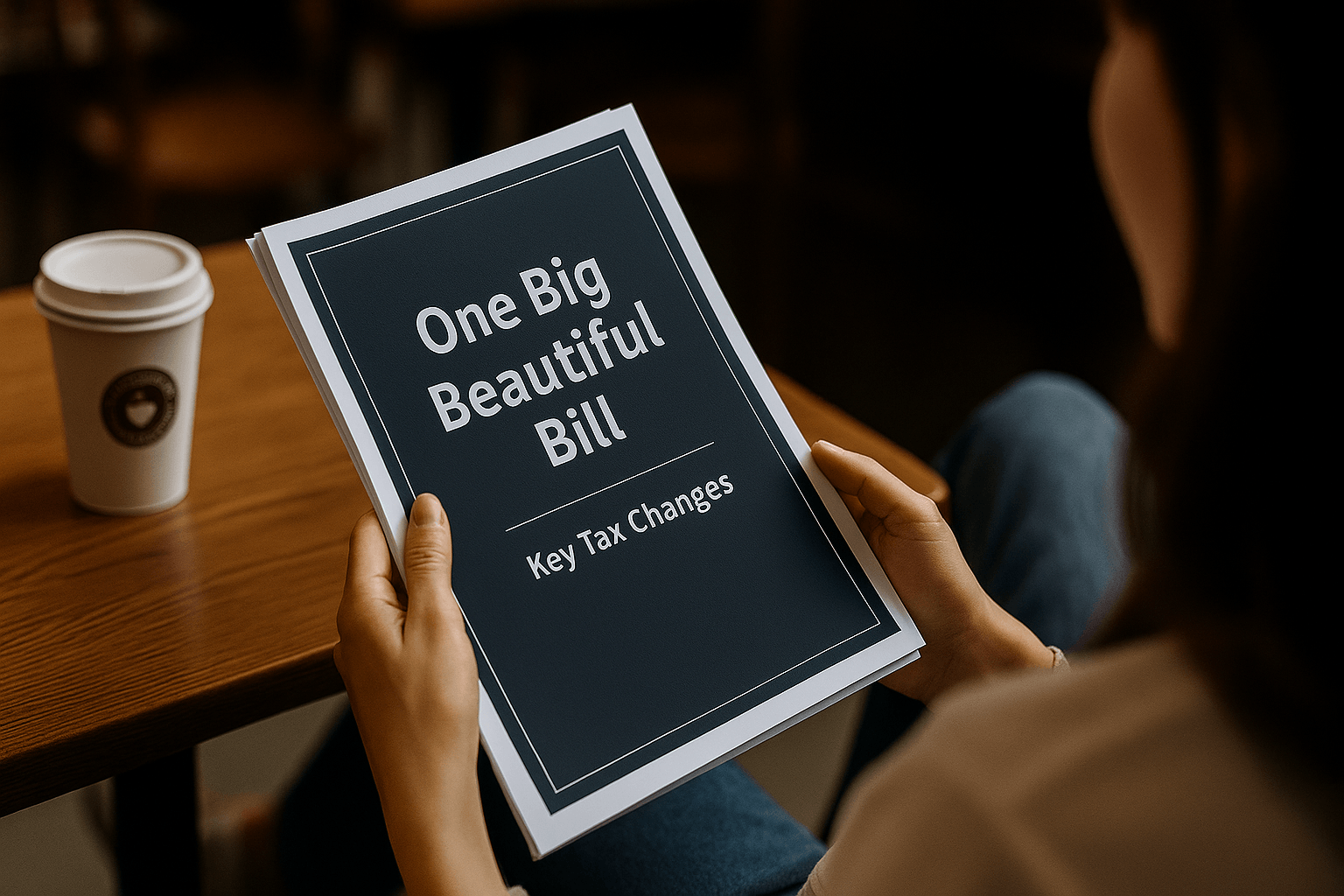On July 4, 2025, the President signed the “One Big Beautiful Bill Act” (OBBBA)—a sweeping tax package with more than 100 provisions affecting individuals, families, and small businesses.
We’ve broken down the tax changes most likely to affect our clients in 2025 and 2026.
This isn’t an exhaustive list, but it covers the key highlights you should be aware of—including updates to the QBI deduction, standard deduction, SALT cap, bonus depreciation, and brand-new deductions like tips and overtime.
Business Provisions
Several provisions aim to make things easier (or at least clearer) for small business owners—from simplifying deductions to adjusting key thresholds. Here’s what’s changing.
- Research & Development Expensing (Section 174)
Full deduction for domestic R&D expenses is back, retroactive for some small businesses.
- Bonus Depreciation Returns
100% bonus depreciation reinstated permanently for qualifying property placed in service after Jan. 19, 2025.
- New 100% Deduction for U.S. Production Property
Applies to qualifying buildings used for manufacturing, production, or refining. Property must be placed in service before 2031 with construction starting between Jan. 19, 2025, and Jan. 1, 2029.
- Section 179 Expensing Limit Raised
Cap raised to $2.5 million.
- 1099 Reporting Thresholds
For 2025: Form 1099-K threshold is $20,000 and 200 transactions. In 2026: Form 1099-NEC threshold rises from $600 to $2,000.
- Covid-Related Employee Retention Credit Crackdown
No new ERC claims allowed after Jan. 31, 2024. IRS is adding penalties for promoters and extending audit windows.
- Paid Family and Medical Leave
Employers who provide paid leave may qualify for a tax credit. Businesses can now purchase paid leave insurance in all states, though many specifics still apply.
- Childcare Credit
Higher limits and rates for small employers.
- Employer Education Assistance
Cap indexed for inflation. Student loans now included permanently.
Individual Tax Changes
Whether you’re self-employed or a W-2 earner, these changes affect nearly every taxpayer. From permanent extensions to new deduction limits, here are the updates that could impact your Form 1040.
- 2017 Tax Act Provisions Extended
Most of the individual changes from the 2017 Tax Cuts and Jobs Act (TCJA) are now permanent—including lower marginal tax rates and limits on certain deductions and losses.
- Standard Deduction Boost + Senior Bonus
The higher standard deduction is here to stay, with a temporary $6,000 senior bonus from 2025–2028. This phases out for higher-income seniors ($75,000 single, $150,000 married filing jointly).
- SALT Deduction Cap Increase
The limit on state and local tax deductions jumps to $40,000 in 2025 if you make less than $500,000. Between $500,000 and $600,000 of income, the deduction phases back to $10,000.
- 199A Deduction Made Permanent
The 20% deduction for pass-through income (QBI deduction) is now permanent. This was a major point of debate and is a win for many small business owners (S corps and partnerships), allowing them to continue deducting a portion of qualified business income on their personal Form 1040s.
- Itemized Deduction Cap for Top Bracket
The value of itemized deductions for those in the top tax bracket is capped at 35¢ on the dollar.
- Estate & Gift Exemption
The exemption rises to $15 million per person in 2026 (indexed for inflation). For 2025, it remains at $13.99 million.
- Charitable Deductions
Non-itemizers can deduct limited cash donations. Beginning in 2026, itemizers must exceed 0.5% of AGI to deduct non-cash donations.
- Mortgage Insurance Premiums
These are now treated as mortgage interest.
- Casualty/Theft Losses and Moving Expenses
These deductions are largely eliminated.
- Gambling Losses
Starting in 2026, the deduction is limited to 90% of winnings. The IRS is also directed to increase enforcement of unreported gambling income.
- Student Loan Forgiveness
Remains tax-free if due to death or disability.
- Adoption Credit
Becomes partially refundable, up to $5,000.
- Scholarship Credit
New credit up to $1,700, available 2026–2029.
- 529 Plans
Expanded to cover homeschool, tutoring, and testing expenses. Higher K–12 limits.
- Trump Accounts
New savings accounts for minors. For newborns, the government contributes $1,000.
- HSA Expansions
More flexible eligibility and contribution rules.
- Fitness Deduction
Up to $500 (single) / $1,000 (MFJ) for qualified fitness costs, such as gym memberships and personal trainers. These costs may be HSA-eligible or count as deductible medical expenses.
- Electric Vehicle & Energy Credits
Credits for new/used vehicles and clean energy are ending. For EVs, purchases must be made by Sept. 30, 2025.
- Changes for Undocumented Immigrants
Reduces ACA premium credits and penalizes states that use state funds to cover undocumented individuals in Medicaid.
- Long-Term Care Insurance
Deductibility rules have changed.
NEW Deductions (2025-2028)
OBBBA introduces new deductions specifically for tips, overtime, and car loan interest—each available only through 2028.
- No tax on tips
A new deduction allows up to $25,000 in reported tips to be deducted on your tax return, as long as they are reported on a W-2 and subject to FICA. Applies to jobs where tipping is common.
- No tax on overtime
A deduction is available for the overtime premium (not total overtime pay), up to $12,500 (single) or $25,000 (MFJ). Overtime must be separately reported on the W-2. Applies to jobs where overtime is common.
- Deduction of car loan interest
Interest up to $10,000/year may be deductible if income is below $100,000 (single) or $200,000 (MFJ). The vehicle must be assembled in the U.S. You don’t need to itemize to take this.
Navigating the New Tax Landscape
There’s a lot packed into this legislation—some changes may affect you directly, others may not. The key is knowing which ones apply to your situation. If anything here raises a flag or feels worth exploring, it’s a good time to check in with your CPA or advisor.
We’ll continue monitoring IRS guidance and incorporating those developments into how we advise clients.
👀Looking for more insights as things evolve? Keep an eye on our Resource Center for updates and practical guidance as new details emerge.



